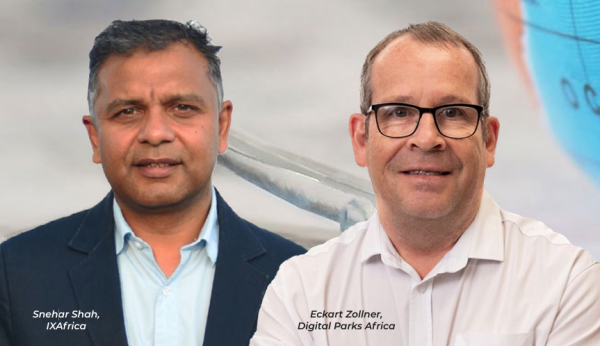13 May 2025
Snehar Shah, IXAfrica; 
Eckart Zollner,
Digital Parks Africa
Africa’s data centre market is booming. Growth drivers like cloud, digitalization and AI are all helping fuel increased demand for data infrastructure, yet challenges remain. We checked in with Snehar Shah at IXAfrica Data CentRE and Eckart Zollner at Digital Parks Africa to find out their views on the future of Africa’s data centre ecosystem.
Africa’s data centre market has witnessed a period of rapid expansion and transformation, driven by increased digitalization, the proliferation of cloud services, and growing investments from global tech giants. This evolution underscores Africa’s rising role in the global digital economy, though challenges such as power reliability, regulatory hurdles, and infrastructure limitations persist.
A market on the rise
South Africa remains the leader in Africa’s data centre expansion, with its deployment capacity exceeding a couple of hundred megawatts. Hyperscalers such as AWS, Microsoft, and Google have established regional zones there, driving increased cloud adoption.
“South Africa leads the pack,” confirms Snehar Shah, CEO of IXAfrica, emphasizing that “a lot of the financial services enterprises have moved to the cloud, hosted locally.”
“We’ve seen tremendous investment in the African data centre market, particularly South Africa, with the arrival of quite a few new cable systems coming into the market, which is bringing a lot of the hyperscalers - and they require data centre presence,” agrees Eckart Zollner, Business development Manager, Digital Parks Africa.
And while South Africa has seen major investments in the past few years, “even into the rest of Africa, we are seeing that the telecommunication environments are growing at an amazing pace, with new data centre locations being opened in countries that were previously reliant on single operators. Such countries are now opening their markets into a deregulated, privatized environment,” says Zollner.
Nigeria follows closely behind South Africa, with a deployment capacity of 40–50MW, while Kenya, a growing hub, is currently estimated at 5–10MW. Indeed, despite the gaps between markets, Kenya and East Africa are catching up. Shah notes that the region is benefitting from submarine cables like Africa-1 and 2Africa funded by tech giants like Meta and Google.
This growth is also evident in the increasing number of data centre operators entering the market. IXAfrica, Digital Parks Africa, and Africa Data Centres are among those spearheading expansion efforts, building new facilities to cater to the rising demand.
“We’ve secured our second site — 30km from Nairobi — where we’ll build a 53MW facility. And we’re already exploring a third site,” Shah reveals.
Beyond investment from local and international players, government incentives and regulatory improvements are fostering growth. Countries such as Kenya, Nigeria, and Ghana are implementing tax breaks and policy reforms to attract data centre developers, reducing entry barriers and enhancing the business climate.
At the same time, multinational corporations are increasingly seeing Africa as a critical market for expansion. Telecommunications companies, cloud service providers, and IT infrastructure firms are all looking to establish a more prominent presence, recognizing that the future of Africa’s digital economy will depend on the availability of world-class data storage and processing facilities.
KEY GROWTH DRIVERS
Cloud adoption continues to be a primary catalyst for data centre expansion across Africa. As businesses in the region increasingly transition to cloud-based solutions, the demand for reliable and scalable data centre infrastructure has surged.
“With a proliferation of good connectivity, we are seeing a great adoption of cloud services,” notes Zollner. “Finance and government are probably the leading sectors, also some of the content providers, the streaming providers, pushing the delivery of their services over the cloud.”
“Some 20,000 of the Kenyan government’s services are now being digitalized, which will require more data centre capacity,” adds Shah.
Beyond enterprise adoption, increasing mobile penetration and digital content consumption are fuelling demand. Affordable smartphones, innovative financial models such as M-Kopa’s financing for mobile devices, and digital services are broadening the market.
Moreover, the growing prevalence of AI and big data analytics is significantly impacting the demand for data centre services. As AI-driven applications continue to emerge across various sectors such as agriculture, finance, and healthcare, they are anticipated to further escalate the need for data consumption and storage capacity.
This heightened demand is driven by the increasing complexity and volume of data generated by these advanced applications, which require robust data infrastructure to process, analyze, and store information effectively.
“We are seeing AI technology as a key driver of the next wave of data centre deployments and data centre demand across the continent. Africa is a little bit behind Europe and the US when it comes to AI, but we are seeing the first very exciting developments taking place there now,” explains Zollner.
Another factor contributing to growth is the expansion of local startups and small businesses into digital platforms. E-commerce, fintech, and online education platforms are thriving, creating additional demand for local data hosting solutions. The ability to store and process data closer to users not only improves latency but also ensures compliance with emerging data sovereignty laws. In addition, gaming and entertainment industries are fuelling further data centre demand. The rapid adoption of video streaming, esports, and cloud gaming requires reliable data infrastructure.
“The content delivery networks (CDNs) are expanding their footprint, and this is a strong indicator that local data storage will be more crucial than ever,” says Shah.

One of the biggest challenges for Africa’s data centre operators is the continent’s unreliable power supply. In South Africa, power outages due to loadshedding have significantly impacted the industry, while other regions also face grid instability.
“Data centres should be treated as national key points, mostly from a position of power surety or power energy guarantee, because national power grids across Africa are under strain,” asserts Zollner. “Data centres, being large consumers of power, feel that their power provisioning should be prioritized. If they have to run off diesel generators or backup power systems, they become extremely expensive to operate.”
In some countries, data centre operators are relying on diesel generators virtually 24/7 to keep the power on – “that is hugely expensive, and diesel generators are also very maintenance intensive machines. This means that we need backups upon backups, because if you have to take one down for service, you need to make sure you have another two running. Protecting the power is absolutely key,” says Zollner.
Data centre operators are also addressing these challenges by investing in alternative energy solutions. Some are exploring nuclear energy and battery storage solutions to reduce reliance on diesel generators and ensure uninterrupted operations. Governments are also stepping in, with some nations prioritizing grid expansion and incentivizing renewable energy projects to improve overall reliability. Additionally, private-sector partnerships with energy firms are also emerging, aimed at stabilizing power access for mission-critical facilities like data centres.
Physical security also remains a concern for infrastructure operators and owners in Africa: “when orange took over the incumbent operator in Kenya and gained all its landline infrastructure, one of the biggest issues that we faced was vandalism of the copper cables. Kenya didn’t mine any copper, BUT we were a bigger exporter of copper than Zambia! We faced similar struggles with fuel and batteries in Uganda within the tower sector,” recalls Shah. “We had to lobby extensively, but the government listened to us, and now that infrastructure is treated as critical. I think the same now applies to data centres.”
Zollner notes that cyber-attacks, too, are a significant and ongoing threat for Africa’s data centre operators.
“With the digitization of our economies and the way we do business and live our lives, data is a new gold,” notes Zollner. “There’s more and more value in getting to the data. Moreover, unlike physical threats, criminals can launch cyber-attacks from any point in the world TO any point in the world.”
With African economies increasingly digitalized, businesses and governments must invest in robust cybersecurity measures to protect sensitive data – and new data sovereignty laws are also shaping the environment as many African governments are implementing regulations requiring local data storage.
“The data protection laws in Kenya came into effect a couple of years ago. They’re somewhat mirrored on the European GDPR laws,” notes Shah. “There are many enterprises and financial services institutions who don’t have the proper control of the primary data. Now, there’s a requirement for what we call ‘reverse migration of the cloud,’ with data being migrated back to a local data centre.”
Net Zero and renewable energy
Sustainability is becoming a major focus on the continent as global hyperscalers increasingly demand greener infrastructure.
As Zollner explains, “the CO2 emissions from any jurisdiction don’t just stay within a country: they affect all of us. This topic is not yet at the right level of importance between governments and the private sectors, because we still face significant other challenges, like unemployment and food security in emerging markets. But there’s no doubting the importance of sustainability and sustainable energy sources is important.”
Shah highlights that 93% of Kenya’s power comes from renewable sources like wind, hydro and geothermal, on top of a very reliable grid.
“We’re very strategically located close to the airport. It’s in a light industrial area, and we have two independent power stations that are connecting our data centre, providing redundancy. We have uptime from the grid alone of more than 99% which for Africa is amazing, but we’ve also built backup infrastructure in terms of batteries and diesel generators to provide continuous power for our clients,” says Shah. “I think you don’t necessarily need renewable energy to provide stability, and there is also a cost benefit equation as well. Everybody asks us, why don’t you use solar power? To provide 22MW of solar power, we must provision 30 acres of prime land in Nairobi - that’s just not cost effective.”
However, renewable energy alone may not solve power stability issues.
“Renewables are important, but base-load energy sources are necessary for 24/7 operations,” says Zollner, emphasizing the need for a mix of traditional and sustainable energy sources. “Renewable energy sources that are widely used these days are quite fluctuating; they operate when the sun is shining, or the wind is blowing. There are some renewable energy sources, such as hydro, biomass or geothermal power, that can provide for stable base loads. A lot of large data centre deployments are looking at smaller nuclear powered energy sources now.”
Operators on the continent are also increasingly prioritizing energy-efficient cooling technologies, such as liquid immersion cooling, to reduce power consumption and improve overall efficiency.
The future: AI, Edge computing, and expansion
Looking ahead, Africa’s data centre market is set to experience further growth, driven by AI, edge computing, and continued investment.
“We are seeing that data centres need to be much closer to where the data is being consumed, and with this, a shift away from the hyperscale, mega data centre projects to more distributed architecture,” says Zollner. “In Africa, we have some small landlocked countries that need a data centre because of data sovereignty, but they may only have a few million people. Modular technology allows you to cost effectively deploy data centres very quickly into small economies.”
Africa’s data centre market is poised for remarkable expansion, driven by cloud adoption, AI, and digital transformation. However, challenges such as power instability, cybersecurity risks, and regulatory complexities must be addressed for sustainable growth.
“We are in active dialogue with regulators to ensure we get the reliability and cost structures we need,” Shah affirms.
Zollner echoes the sentiment: “Partnering within the greater ecosystem is key to bringing data centre solutions to emerging markets. We need to look at doing what we do more efficiently and making it more affordable. That’s where the ecosystem comes in, and that’s where partnering comes in. Rather than everybody investing in the same infrastructure, infrastructure can be shared, and I think we’ve seen it with the mobile operators and outsourcing towers. The same can be done at the data centre.”








